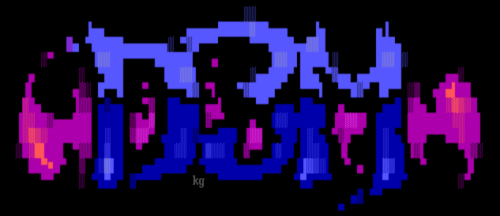
Demonic (frequently stylized as “Demonic Productions”) was an underground BBS modding and coding group founded in late 1996 and remaining semi-active until around 2006.
In BBS terms, modding describes making modifications to BBS software (or an individual BBS setup) in order to customize its appearance and/or functionality. The modding scene consisted of SysOps, programmers, and other hackers with a passion for producing these modifications for public consumption, typically releasing and distributing them as part of a modding group, similar to the other groups, such as art scene groups, demo groups, and warez/cracking groups, that sprung out of the underground computer scenes in the 1980s and 1990s. These modifications themselves were released in a wide variety of formats, from source code snippets and guides and tutorials, to compiled programs such as standalone utilities and “door” programs.
Demonic originally sought to pair simple yet creative mods based on replacement display files, menu files, and scripts for specific BBS software with larger, more complex, multi-software doors and utilities, with an early focus on above average artwork and releasing source code, which was relatively uncommon at the time. Uniquely, Demonic also had the support of many BBS software authors, with members involved in closed testing for projects like iDT’s Iniquity releases, Team ITC’s INSTiNCT BBS, and Nivenh’s (and later Horrid’s) Impulse, and even counting Voivode (Illusion) and g00r00 (Mystic) among our ranks.
Unlike many such groups, Demonic sought to carry on the tradition of releasing art scene style mod “packs” as popularized by groups like Illness, FiRM, Cream, and TRiC, collecting various unreleased productions into a single archive. We originally released packs every other month but quickly lost any semblance of a consistent release schedule, ending up with 7 total packs before switching to an individual release model in late 1998. By the time the group finally burned out we had over 220 releases under our belt, supporting BBS software such as Daydream, Eternity, Illusion, Impulse, Infusion, Iniquity, Instinct, Mystic, Nexus/2, Oblivion/2, PCBoard, Renegade, Synchronet, Telegard, and WWIV.
As of September 2022, Demonic has been resurrected!
View and download our current releases here (updated 12/2024)
Stay tuned for articles about Demonic’s history, information about its releases, both new and classic, and much more in the coming months!
Other notable articles related to Demonic:
- Demonic Newsletter 4/2023 Edition – Group updates from April 2023.
- Demonic Newsletter 9/2022 Edition – Group updates from September 2022.
- Demonic is back! – A quick news post about Demonic’s resurrection.
- All posts tagged with Demonic.
—
1. Demonic by Kargus, released in Demonic #6 – 6/98 (1998)